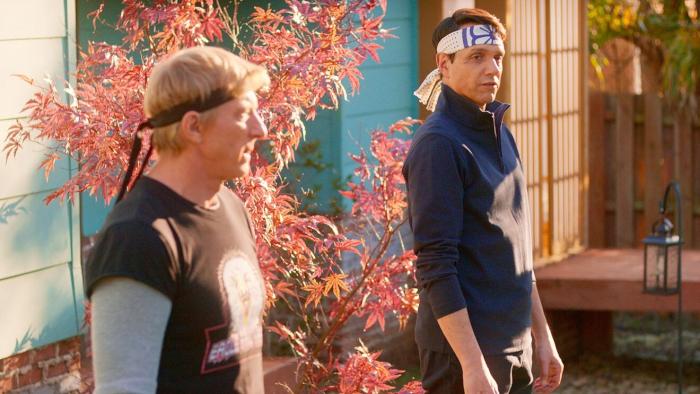By Dustin Rowles | TV | January 5, 2022

(Warning: There are some spoilers for season four below.)
Part of the reason why the original 1984 The Karate Kid movie was such as smashing success is that it gives us the climactic finale we all want. After all his efforts, Daniel LaRusso defeats bad guy Johnny Lawrence and gets the girl; the big bad John Kriese is humiliated, and the wisdom of Mr. Miyagi’s approach to karate wins out. All the loose ends are tied up the instant LaRusso crane kicks Johnny in the face, and the movie abruptly ends. I think part of the reason the sequels weren’t as successful — besides the fact that they aren’t nearly as good — is because we never really needed them. The Karate Kid gave us a perfect, satisfying ending.
While I have loved every season of Netflix’s sequel series, Cobra Kai, I approach each one skeptical about the show’s ability to remain as good as it is. Yet every season seems to be as good as the last, but unlike the original movie, every season also leaves us wanting more.
Therein lies the key, the magic ingredient to the continued success of Cobra Kai. It stubbornly refuses to give us what we want because as soon as it does, showrunners Josh Heald, Jon Hurwitz, and Hayden Schlossberg understand that we will lose interest. Cobra Kai is the television equivalent of the “thrill of the chase,” and if it ever emotionally captures what it is that we are chasing, we will find something else to watch. It functions similarly to the way another beloved sports drama, Friday Night Light, operated. Rather than refuse to give us exactly what we wanted at the end of each season (season two, notwithstanding), Jason Katims balanced the sweet with the bitter. If the Dillon Panthers lost a championship, it would win a moral victory. If it won a championship, Riggins would go to prison. Its victories were balanced by defeats.
Cobra Kai consistently stops short of total victory. It takes us to the edge; it teases us, but it never goes all the way. There are moments, for instance, where Daniel and Johnny put aside their differences and work together toward a common goal, but they infuriatingly refuse to become friends. We’re dying to see these two men hug it out, but while they often get tantalizingly close, something always gets in the way. Likewise, for four goddamn seasons, we’ve waited for Johnny to be the father he needed to be for Robby, and just as he finally shows up for him, he does the wrong thing to the other kid to whom he aspires to be a father figure, Miguel. No moment is more painful this season than when an intoxicated Johnny tells Miguel that he wants to be the dad he needs, only to drunkenly mistake him for Robby.
We’re also angling to see John Kriese turn the corner from villainy just enough to show us that he has an ounce of compassion buried somewhere underneath, but as soon as he does exactly that this season? He’s arrested and taken away, replaced by someone even more evil than Kriese, Terry Silver.

The other way it keeps from giving us what we want is by dividing our loyalties. Karate Kid was black-and-white, good-and-evil to a fault. Cobra Kai finds a way to humanize nearly every character. Eli ‘Hawk’ Moskowitz went from a kid being bullied to being the bully and then to the underdog champion for whom we actually root. Tory Nichols is in the midst of that journey herself, while Daniel’s daughter, Samantha, is on the verge of bully status for the way she refuses to acknowledge her privilege in relation to Tory’s. It’s beyond remarkable that by the end of the fourth season, we find ourselves rooting for the third season’s most heinous character.
Miguel, meanwhile, has been the Daniel LaRusso of the series for three seasons — the perpetual underdog for whom we loved to root — but by the time the All-Valley Tournament rolls around this season, we only want to see Johnny do the right thing and pull him from the match to illustrate that he cares more about Miguel than his dojo. Johnny does care more about Miguel than his dojo, but he doesn’t recognize that until it’s too late.
It’s almost shocking what the showrunners have been able to accomplish over four seasons by making a few critical adjustments to the original Karate Kid: What if Johnny wasn’t all bad? What if Daniel wasn’t all good? What if they had flaws, and what if those flaws were rooted in honest places? What if, instead of creating archetypes, they created real human characters, and what if not just their good qualities but their flaws and insecurities were reflected in their children and in their students?
It’s stunning how good a show can be when the writers maintain their focus not on the story but the character and let the story evolve from there. I don’t know how many more seasons Cobra Kai can sustain itself, but it says something about how good the series is that after the fourth season I’m looking as forward to the fifth as I was the second. I love these characters (except Terry Silver), and I want to see it work out for all of them. I understand that as soon as it does, however, there will be no more reason to watch Cobra Kai.